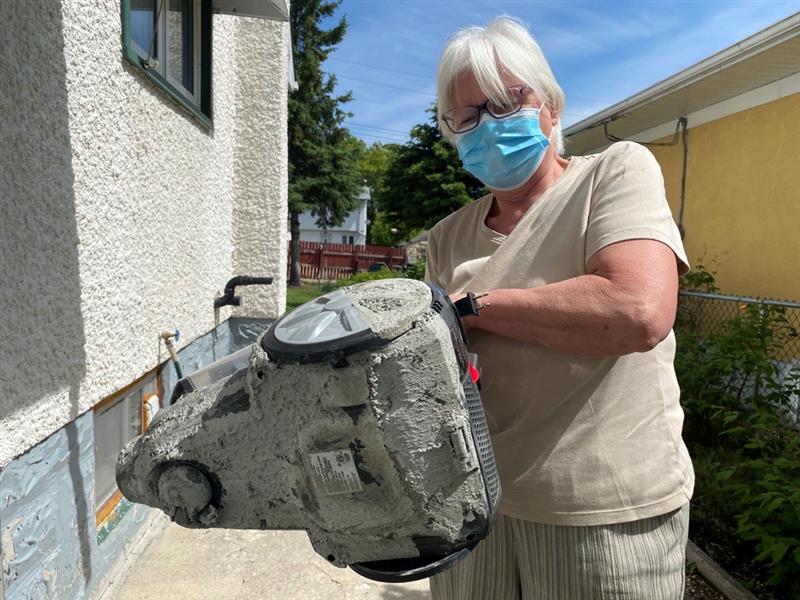Several homeowners on a north Winnipeg street are cleaning up and looking for answers after cement came bubbling up through their sewer lines — filling basements — and in one case, nearly the entire first floor of a family home.

Kaitlin Bialek says her husband first noticed the trouble when he went downstairs to get some equipment as they painted their Semple Avenue home Saturday.
“He started swearing because there was about four feet of cement coming out of our sewer drain,” Bialek said Wednesday, telling Global News the couple quickly ran out of the house to check to see if construction work happening down their street had something to do with the problem.
“We came out yelling at the guys to stop what they were doing,” Bialek said.
“We didn’t know what to do, we were shocked.”
It was the same situation at their neighbour George Munroe’s house, who says he first noticed the slurry coming up through a basement sewer line around 9 a.m.
“It took us about four, five hours to try and clean it up,” said Munroe, who quickly started scooping the wet cement into buckets.
Ultimately, Munroe says roughly four-and-a-half inches of cement came into his basement, and while he was able to clean most of it up before it hardened, he’s worried about what’s left stuck in the pipes.
He said city engineers have told him to run his taps and flush the toilets in the house to try to clean out the lines, but, he says, after several days he knows hardened cement is still in his lines.
“We can’t use our washing machines because they’re plugged,” he said.

In an email to Global News, a city spokesperson said a contractor hired by the city had been grouting a sewer trunk shaft as part of a project at the corner of at Semple Avenue and Scotia Street when a “breach of the combined sewer occurred,” allowing grout to enter the sewer line.

Get daily National news
The city said it’s still investigating the cause and expects repairs to the breach to finished by mid-June.
The spokesperson said 12 houses were affected in all, and all but one should still have access to the sewer line.
‘The Blob on Semple Avenue’
It’s safe to say the home without sewer line access is the one owned by Fraser Jack.
Unlike his neighbours, Jack wasn’t home when the breach happened Saturday morning. He wasn’t even the city.
“I was enlightened about what was happening when my dad (called and) told me that I might be starting renos a little bit sooner than expected,” grinned Jack outside the home that’s been in his family since the mid-50s.
Jack says he drove all night from his job in northern Manitoba to find hardened cement “all throughout my house” the next day.
He said the slurry had came up through a main floor toilet, flooding the bathroom, two bedrooms and the living room on the first floor. There’s another roughly four inches of concrete throughout the basement, he said.
“All my plumbing is done, it got down into by duct work, in my furnace, my furnace is a total write off,” he said.
The house Jack grew up in with his grandparents got so filled with the slurry, it even poured out and into his yard.

He says friends have told him the house looks like a scene from the cult-horror movie classic, The Blob.
“It seems fitting, I think we’ll call it The Blob on Semple Avenue.”
Jack said his insurance agent is still looking into the mess, and as of yet, he’s not sure if the home will be a total write-off.
“We’re just starting to peel back the first layer of this, and it’s going to get good,” he said, wryly.
While the city would not comment on specific claims, a spokesperson said affected homeowners should contact their insurance representatives for advice on how to handle losses.
They said homeowners can also submit a claim to the city if they think the city, or a contractor working for the city, is responsible.
Most of the neighbours Global News spoke to this week said they feel the city should be doing more to help clean up.
“The city should be responsible, and they should be responsible for taking the goods out because I can’t,” said Steffie Shrimpton, who ended up with four-inches of cement in the basement of the home she’s lived in for 30 years.
“I think they should have, before they started the project, maybe they should have checked to make sure nothing like this would happen.
“It’s just terrible.”
— With files from Clay Young and Joe Scarpelli








Comments